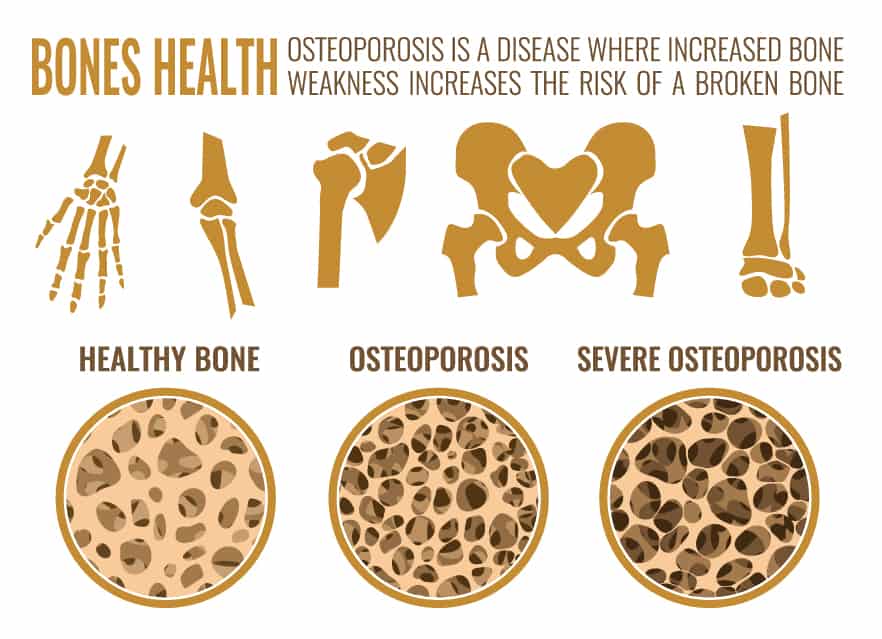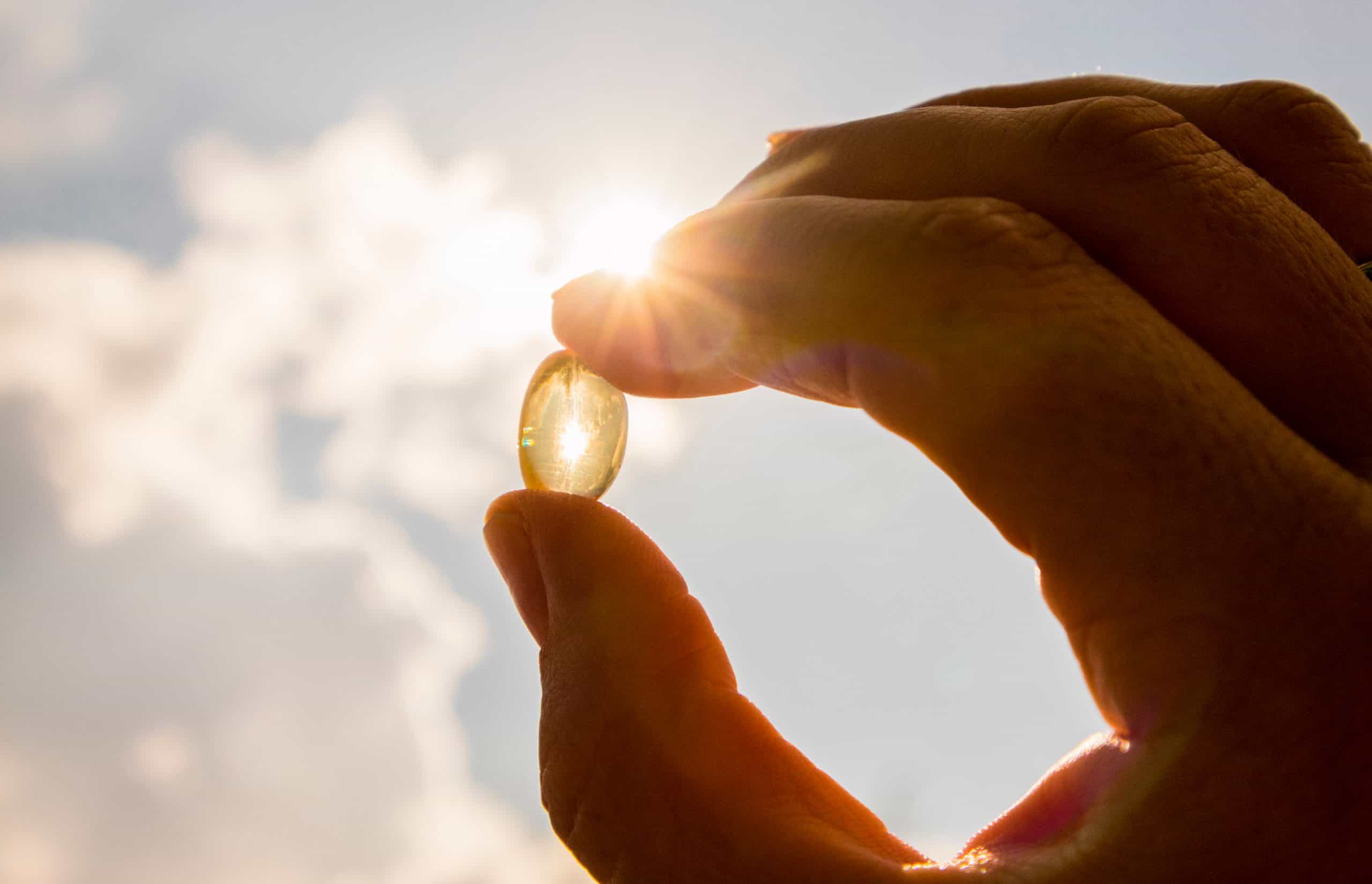If you’re of a certain age, you may remember ads that promise milk “does a body good,” or recommend “3 a day,” which refers to three servings of dairy. These campaigns emphasize how calcium consumption creates strong bones, but they forget to mention another key player: vitamin D. Despite its name, vitamin D is actually a prohormone, not a vitamin. Prohormones help your body transform substances into the hormones your body needs to thrive.
Vitamin D is an essential nutrient for kids and adults. From increasing calcium absorption to reducing your risk factors for osteoporosis, here are five ways vitamin D supports bone health.
1. Vitamin D Boosts Calcium Absorption

We mentioned earlier that calcium plays a part in bone health. Unfortunately, medical conditions or lifestyle choices leave some patients with a calcium deficiency. When this happens, you may experience dental problems, depression, or brittle bones.
Vitamin D boosts calcium absorption so your body can enjoy the full benefits of this important nutrient. This helps ensure blood calcium levels remain at optimal amounts, encouraging bone mineralization. Proper bone mineralization helps reduce the risk of some health ailments, including rickets and osteomalacia.
Calcium also boosts your mental health. A calcium deficiency can make you irritable or anxious, and it may cause or contribute to depression. You may also feel weak or exhausted, so it's important to make sure your body properly absorbs the calcium it needs.
2. Vitamin D Enhances Your Mood
If you've ever dealt with bouts of depression, you may have found it hard to get motivated. As a result, perhaps you abandoned your usual activities, such as exercise or meal prep. You may have even binged on junk food or replaced healthy coping mechanisms with vices such as alcohol consumption.
Vitamin D consumption helps prevent these issues by regulating your mood. This gives you the mental boost you need to make the most of each day. Some people spend time in the sun with the goal of absorbing vitamin D. Experts recommend getting at least 5 to 30 minutes of sunshine, twice a week, for optimal results. You can also take supplements or eat foods that contain this nutrient to ensure your body is getting enough. Options include egg yolks, cheese, tuna, and salmon.
3. Healthy Vitamin D Levels Reduce the Risk of Falls

Everyone trips over objects occasionally, or falls while they're in a hurry, but a nasty fall can be quite serious, especially for senior citizens. Falls are the leading cause of death for elderly adults, but they also affect other adults and kids. Maintaining healthy levels of vitamin D helps reduce your risk of falling. That's because vitamin D helps strengthen your bones. When your bones are strong, they can adequately support your body as you walk, run, or perform other movements.
Not all falls are fatal, but when you fall, any of the following injuries can occur:
- Broken, fractured, or sprained bones
- Discs that move out of alignment in your back or neck
- Swollen muscles
- Head injuries, such as a concussion
- Puncture wounds
- Minor concerns, such as scrapes or scratches
If serious issues occur after a fall, let us know so we can help. Our chiropractic team can gently move your spine back into place, or you can seek treatment from one of our experienced physical therapists to help you heal and regain mobility.
4. Vitamin D Reduces the Risk of Osteoporosis
Worldwide, more than 20 million people have osteoporosis. This painful condition often occurs in older adults and sometimes stems from menopause. However, you can get osteoporosis as a child, too. When kids between the ages of 8 to 14 develop this condition, it's known as juvenile osteoporosis.
Osteoporosis makes your bones weak, which increases your risk of long-term damage from bumps or falls. Approximately 80% of osteoporosis diagnoses affect women, as their bones are often smaller and thinner than those of men. Low estrogen levels also cause bone loss, which is why many women develop osteoporosis after menopause.
At Northeast Spine and Sports Medicine, we often treat patients with osteoporosis. Let us know if you suspect you have this condition so we can perform an evaluation. With treatment, you may experience less pain or discomfort from this bone-weakening condition.
5. Vitamin D May Boost Cognitive Function
When your brain works correctly, it helps you make good decisions so you can stay safe and healthy. Vitamin D boosts cognitive function, which may help you protect your bones. You can better assess risks and make choices that promote wellness when your brain gets the nutrients it needs.
Adequate vitamin D levels may also reduce your risk of developing dementia or Alzheimer's disease.
What Else Should I Know About Vitamin D?

Vitamin D plays a strong role in bone health, but it also impacts other conditions. A vitamin D deficiency may result in a number of conditions, including:
- Multiple sclerosis
- Cancer
- Genetic disorders, such as familial hypophosphatemia
- Plaque psoriasis
- Cardiovascular disease, including type 2 diabetes
Keep in mind that a calcium deficiency may also indicate you need more vitamin D. Vitamin D helps your body absorb calcium, so your bones are strong and hard. Without adequate vitamin D or calcium, your bones may become soft or brittle. This makes it difficult for your skeletal system to effectively support your body. When your skeletal system is weak, you may have a higher risk of fractures or breaks.
Your doctor can check calcium and vitamin D levels with a simple blood test. Some tests can check how much vitamin D you have from sunlight as well as nutritional choices. If test results indicate levels are below normal, your doctor may recommend supplements or dietary changes. You may also require treatment for muscle cramps, weak bones, or other issues associated with your deficiency.
Be careful when supplementing on your own, as it's possible to take too much vitamin D. Excess vitamin D may cause calcium stones, bone pain, or kidney issues. We can help you work through these concerns at Northeast Spine and Sports Medicine, so let us know which supplements you're taking. We can also help you address dietary concerns, such as figuring out how to get more vitamin D from natural sources.
Protect Your Bones With Help From Our New Jersey Team
Taking vitamin D supplements can help if you aren't already eating foods that contain ample amounts of this nutrient. However, you may already have pain or complications that stem from a vitamin D deficiency. At Northeast Spine and Sports Medicine, our skilled staff has experience treating patients with osteoporosis and similar concerns. Our services include chiropractic care, physical therapy, and therapeutic injections.
Each treatment plan is tailored toward the patient's unique needs. Give us a call if you experience bone pain or muscle cramps that you suspect stem from a lack of vitamin D. Our team will perform a thorough examination and recommend services to help you feel your best. We have eight New Jersey offices available, including locations in Monmouth County and Ocean County.

